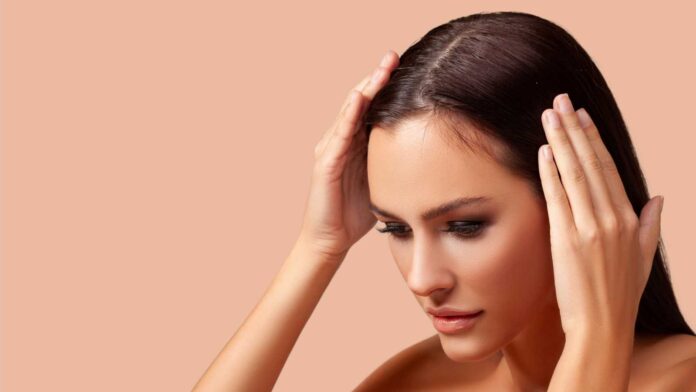Hair anxiety can be real when you go through something like hair thinning or hair loss! Know more about it from a doctor.
In modern urban life, where image and personal appearance hold significant importance, many women are finding themselves grappling with a new source of anxiety: hair thinning. A healthy and vibrant mane has long been associated with beauty and confidence, making the prospect of hair loss particularly distressing. No longer a concern relegated to ageing, hair thinning has become a widespread issue affecting every second woman in urban environments. Amid the challenges of fast-paced lifestyles, the anxiety surrounding hair health is becoming increasingly hard to ignore.
What is hair anxiety?
Why are women worried? Women in bustling cities often juggle multiple roles—those of career-focused professionals, dedicated family members, and active social participants. These daily demands can be overwhelming and stressful. “A combination of stress, pollution, and dietary changes often disrupts hair health. Unfortunately, the visible signs of hair thinning, excessive hair loss or even a change in hair texture, can have a profoundly negative impact on self-esteem and body image, causing many to turn inward and question their worth and attractiveness,” Dr Viral Desai, Cosmetic and Plastic Surgeon, tells Health Shots.
Why do I have hair anxiety?
Hair is undeniably tied to identity and self-expression for many women. When hair begins to thin, it can evoke feelings of frustration, insecurity, and a sense of loss of control, as reported in the Indian Journal of Plastic Surgery.
Several factors can contribute to hair anxiety. Here’s a closer look:
- Stress and lifestyle: “Modern life is filled with stressors. When we’re under pressure, our bodies react in various ways, which can unfortunately include hair loss. Chronic stress affects hormonal balance, leading to conditions such as telogen effluvium, in which hair prematurely enters the shedding phase,” shares Dr Desai.
- Diet and nutrition: Food often takes a backseat when women are busy balancing work and family. A diet lacking in vital nutrients—such as vitamins, minerals, and proteins—can adversely affect hair health, as per the journal Dermatology and Therapy. Important nutrients that promote hair growth include iron, zinc, and vitamins A, C, D, and E.
- Medical conditions: Various medical conditions can contribute to hair loss. Autoimmune disorders like alopecia areata, thyroid issues, and genetic predispositions can cause thinning hair, according to the National Alopecia Areata Foundation. Understanding these medical factors is crucial for effectively addressing hair loss.
- Environmental factors: Urban environments are rife with pollution, which can damage not only the skin but also the hair. Additionally, exposure to harsh weather conditions and the hustle of city life can further exacerbate hair issues.

“It’s more than just a cosmetic problem; it becomes an emotional burden as societal standards perpetuate the idea that physical appearance equates to personal value. The pressure to maintain a particular look in a world where appearances matter can lead to a cycle of anxiety and low self-esteem,” suggests Cosmetic Surgeon.
How to deal with hair anxiety?
While hair anxiety is a legitimate concern, several strategies can help mitigate its effects. Here are some actionable tips:
- Balanced diet: “Focus on a nutrient-rich diet that includes plenty of protein, fruits, and vegetables. Foods like spinach, salmon, nuts, and eggs are excellent for promoting hair health”, advises Plastic Surgeon.
- Stress management: Finding effective ways to manage stress is vital. Consider incorporating activities such as yoga, meditation, or simple breathing exercises into your daily routine, as per The Yoga Institute.
- Regular exercise: Physical activity is beneficial for overall health and can enhance mood and reduce stress levels, according to the UK’s National Health Institute. Aim for at least 30 minutes of exercise most days.
- Good sleep cycle: Prioritise sleep. A good sleep cycle is vital for recovery and health, including hair health. Aim for 7-9 hours of sleep each night, as recommended by the American Heart Association.
- Nutritional supplements: Consult with a healthcare provider about taking supplements that support hair health. Biotin, iron, and omega-3 fatty acids can be beneficial additions to a healthy diet.
- Gentle hair care products: “Use hair care products that are gentle and free from harsh chemicals. Opt for shampoos and conditioners that nourish your hair rather than stripping it of essential oils”, says Dr Desai.
- Professional consultations: For persistent concerns about hair thinning, consulting with a dermatologist or trichologist can provide tailored advice and treatment options.
You may also like


Disclaimer: At Health Shots, we are committed to providing accurate, reliable, and authentic information to support your health and well-being. However, the content on this website is intended solely for informational purposes and should not be considered a substitute for professional medical advice, diagnosis, or treatment. Always consult a qualified healthcare provider for personalised advice regarding your specific medical condition or concerns.

